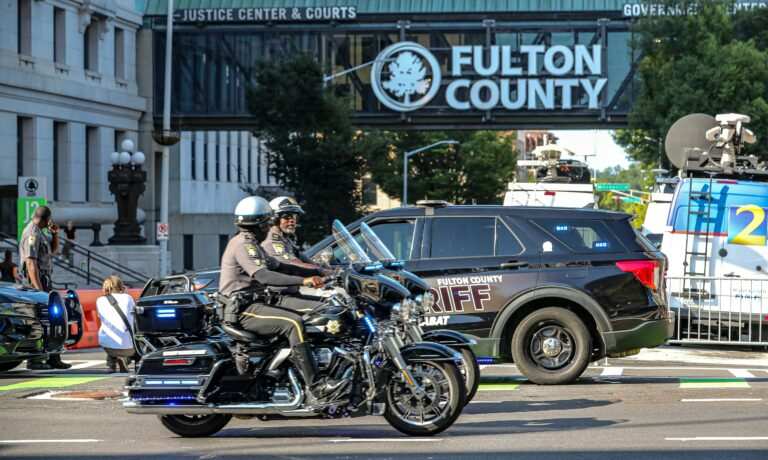
The Fulton County Sheriff’s Office announced Thursday it is investigating online threats to the members of the grand jury that indicted former President Donald Trump and 18 others earlier this week.
“We take this matter very seriously and are coordinating with our law enforcement partners to respond quickly to any credible threat and to ensure the safety of those individuals who carried out their civic duty,” the sheriff’s office said in a statement.
The names and purported addresses of the grand jurors started turning up shortly after the indictment on far-right and conspiracy-laden online forums, with some posts threatening revenge.
The doxing of the grand jury is the latest in a barrage of outrage directed at Trump’s perceived enemies. Experts who monitor domestic extremism say such elevated rhetoric runs the risk of inciting violence.
“Every time something like this happens you are going to have more or less the same type of reaction,” said Jon Lewis, a research fellow at the George Washington University Program on Extremism.
The online reaction to this week’s indictment on far-right message boards has mirrored that of Trump’s prior three indictments, Lewis said. But just because such threats have become commonplace, it does not mean the danger is lessened, he said.
Earlier this month, a Texas woman was charged with threatening the judge overseeing Trump’s federal criminal case in Washington.
According to an affidavit filed by an agent with the Federal Protective Service Abigail Jo Shry allegedly left a voicemail on the telephone of U.S. District Court Judge Tonya Chutkan in Washington, D.C., threatening to kill her, U.S. Rep. Sheila Jackson Lee, D-Texas, and “anyone who went after former President Trump.” The arrest was first reported by Bloomberg Law.
“You are in our sights, we want to kill you,” Shry allegedly said in a message punctuated with racial epitaphs.
Lewis called the diatribe, “very clear threatening language towards a sitting U.S. District Court judge.”
“I think that should obviously be a concern, when you look at the fact that the identities of average American citizens who were part of this grand jury are now out there in the public space as well,” he said.
Some Trump supporters jumped on the release of the names, printed on the indictment, as a mistake or even a trap set by the former president’s enemies, but Georgia law and legal precedent require the names to be included with an indictment. In a series of posts on X, formerly known as Twitter, Georgia State University law school professor Anthony Michael Kreis pointed out that the law and a state Supreme Court decision interpreting it have been on the books for more than a century.
Laws and rules protecting the identities of jurors vary by state. In most states, including Georgia, the names of jurors in criminal and civil trials are public, in keeping with the principle that courts should be open to the public.
But grand juries don’t decide guilt or innocence and instead determine whether there is enough evidence to issue criminal indictments. Those proceedings are generally kept secret, and the federal courts and the courts of many other states protect jurors’ identities, as well as the identities of witnesses who testify before them.
Amy Cooter, research director for Middlebury Institute’s Center on Terrorism, Extremism, and Counterterrorism, said posting the personal details of perceived enemies online isn’t a new tactic for extremists, “but this seems like a concerted effort.”
The march of indictments against the former president appears to have created an escalating online environment for violent language and wild conspiracies, she said.
When the Fulton County court clerk’s office mistakenly posted a test document on its website listing charges against Trump hours before the indictment was public, Charlie Kirk, founder of the conservative group Turning Point USA, posted his thoughts on his Telegram channel and included a link to an article in the conspiracy-minded newspaper The Post Millennial. While neither Kirk nor the article directly alleged wrongdoing, commenters on the post replied with profanities and threats.
For months, Willis has spoken about the threats she and her office have received while investigating Trump. Cooter said that kind of language can inspire someone to take action.
“Whenever specific people are included, I get a little concerned that something can happen. There are true believers out there, extremists who want something to attack,” she said.
Last year, following an FBI-led raid on Trump’s Mar-a-Lago residence in a search for classified documents, a man who had posted his outrage about the raid to Truth Social allegedly attacked the FBI office in Cincinnati with a nail gun in an apparent attempt to defeat the bullet-proof glass.
Cooter blamed influential figures on social media, including Trump, for stoking anger and conspiracy theories in a way she said is designed to provoke outrage.
“When somebody starts down that road, it becomes very difficult to break away from it,” she said. “Paranoia about the government as a whole is going to grow and grow.”
___
© 2023 The Atlanta Journal-Constitution
Distributed by Tribune Content Agency, LLC.
0 comments :
Post a Comment